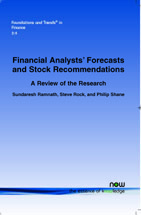Financial Analysts' Forecasts and Stock Recommendations: A Review of the Research
By Sundaresh Ramnath, School of Business Administration, University of Miami, USA, S.Ramnath@Miami.edu | Steve Rock, Leeds School of Business, The University of Colorado at Boulder, USA, Steven.Rock@Colorado.edu | Philip B. Shane, College of William and Mary, USA, Phil.Shane@mason.wm.edu
Abstract
This surveys reviews research regarding the role of financial analysts in capital markets. The survey builds on the perspectives provided by Schipper (1991) and Brown (1993). We categorize papers published mainly since 1992 and selectively discuss aspects of these papers that address or suggest key research topics of ongoing interest in seven broad areas: analysts' decision processes, the determinants of analyst expertise and distributions of individual analysts' forecasts, the informativeness of analysts' research outputs, analyst and market efficiency with respect to information, effects of analysts' economic incentives on their research outputs, effects of the institutional and regulatory environment (including cross-country comparisons), and the limitations of databases and various research paradigms.
Financial Analysts' Forecasts and Stock Recommendations
Financial Analysts' Forecasts and Stock Recommendations reviews research related to the role of financial analysts in the allocation of resources in capital markets. The authors provide an organized look at the literature, with particular attention to important questions that remain open for further research. They focus research related to analysts' decision processes and the usefulness of their forecasts and stock recommendations. Some of the major surveys were published in the early 1990's and since then no less than 250 papers related to financial analysts have appeared in the nine major research journals that we used to launch our review of the literature. The research has evolved from descriptions of the statistical properties of analysts' forecasts to investigations of the incentives and decision processes that give rise to those properties. However, in spite of this broader focus, much of analysts' decision processes and the market's mechanism of drawing a useful consensus from the combination of individual analysts' decisions remain hidden in a black box. What do we know about the relevant valuation metrics and the mechanism by which analysts and investors translate forecasts into present equity values? What do we know about the heuristics relied upon by analysts and the market and the appropriateness of their use? Financial Analysts' Forecasts and Stock Recommendations examines these and other questions and concludes by highlighting area for future research.
